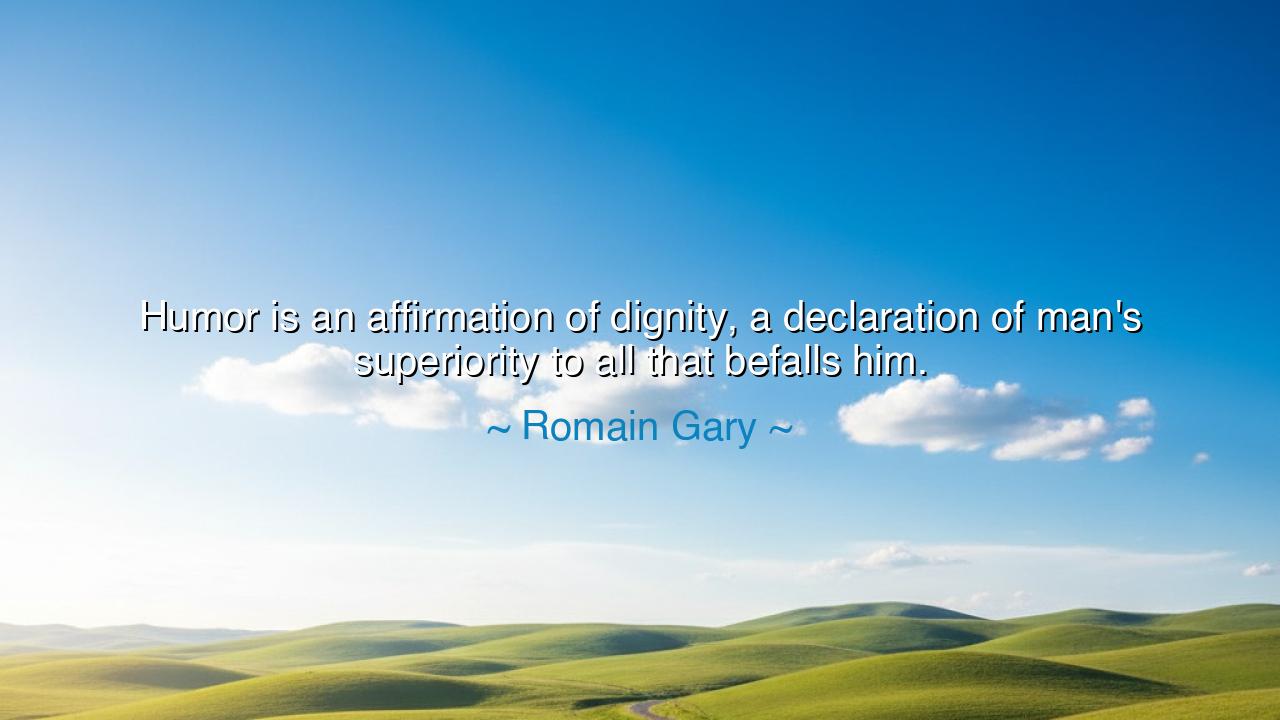
Humor is an affirmation of dignity, a declaration of man's
Humor is an affirmation of dignity, a declaration of man's superiority to all that befalls him.






When Romain Gary said, “Humor is an affirmation of dignity, a declaration of man’s superiority to all that befalls him,” he was not speaking of laughter as amusement alone — he was speaking of laughter as defiance, as an act of the soul’s sovereignty over suffering. His words are a banner for the human spirit: that in the face of loss, humiliation, or despair, man retains one final, unconquerable weapon — humor, the ability to smile and say, “You may hurt me, but you cannot own me.” For Gary, who lived through war, exile, and tragedy, this truth was not theory; it was survival. His laughter was not that of comfort, but of courage — the laughter of one who refuses to kneel before fate.
The ancients would have called this the laughter of the wise, the laughter that rises not from ignorance, but from understanding. It is the laughter of Socrates, calmly drinking the hemlock; of Epictetus, the slave-philosopher who taught that no one can enslave the mind; of Diogenes, who mocked the kings of Greece from his barrel, proving that dignity lives not in power, but in freedom of spirit. Humor, in Gary’s sense, is the soul’s rebellion against tragedy. It transforms pain into perspective, and defeat into meaning. Through it, man affirms that while he cannot always control what happens to him, he can control how he faces it — and that is where dignity is born.
Gary himself knew the power of this truth. A decorated hero of the Free French Forces during World War II, he had seen the collapse of nations and the cruelty of men. Yet he refused to let hatred or despair consume him. Instead, he wrote — stories filled with wit, irony, and compassion. In a world shattered by war, he used humor as his light, proving that laughter could exist even amid ruin. To him, humor was not escape — it was resistance. Every joke was an act of faith in humanity, every smile a declaration that the spirit cannot be broken by the weight of circumstance.
Consider also the example of Viktor Frankl, the psychologist and survivor of the Nazi concentration camps, who once wrote that “humor is another of the soul’s weapons in the fight for self-preservation.” In the camps, he and others would tell jokes — small, dark, absurd — even as they faced starvation and death. That laughter was not cruelty or delusion; it was a shield. It was the human spirit claiming, for a brief moment, its superiority over the horrors that surrounded it. That is what Romain Gary meant — that humor is dignity. To laugh, even when everything is taken from you, is to prove that the essence of who you are cannot be taken.
To affirm dignity through humor is to remember that we are more than our suffering. Life will test every man — through failure, through loss, through humiliation — but it is the one who can still laugh that shows mastery over the storm. The man who can smile at his misfortune has already defeated it. His laughter says, “You may wound my body, but not my soul.” This is why Gary calls humor a declaration of superiority — not arrogance over others, but supremacy over despair, over chaos, over fate itself. It is the laughter of one who stands tall even in defeat, who finds meaning where others see only ruin.
Yet there is a tenderness in this wisdom as well. For true humor is never cruel — it is compassionate. It sees folly in others because it has recognized folly in itself. It mocks the absurdity of life, not to belittle it, but to embrace it. The man who laughs at his own misfortune has already forgiven the world. That forgiveness — gentle, wry, and full of grace — is the purest form of strength. It is how humanity survives without losing its soul.
The lesson, then, is timeless and sacred: when life strikes, answer not with bitterness, but with humor. When fate mocks you, smile back. When all else fails, let laughter remind you that you are still the author of your own spirit. For as Romain Gary teaches, humor is not a weakness — it is the crown of human dignity, the final proof that man is greater than his suffering. Practice it in hardship, wield it in fear, and carry it like a torch through the darkness. For those who can still laugh, even when the world falls silent, are the ones who will always rise again.






AAdministratorAdministrator
Welcome, honored guests. Please leave a comment, we will respond soon